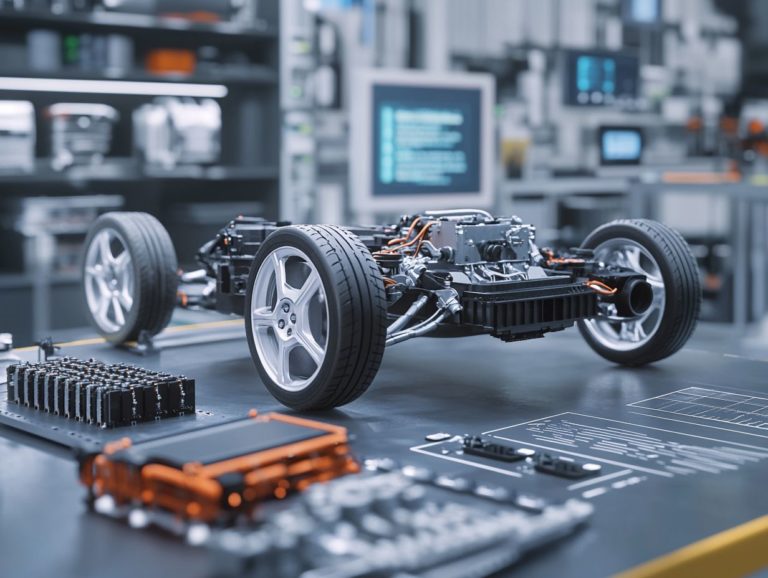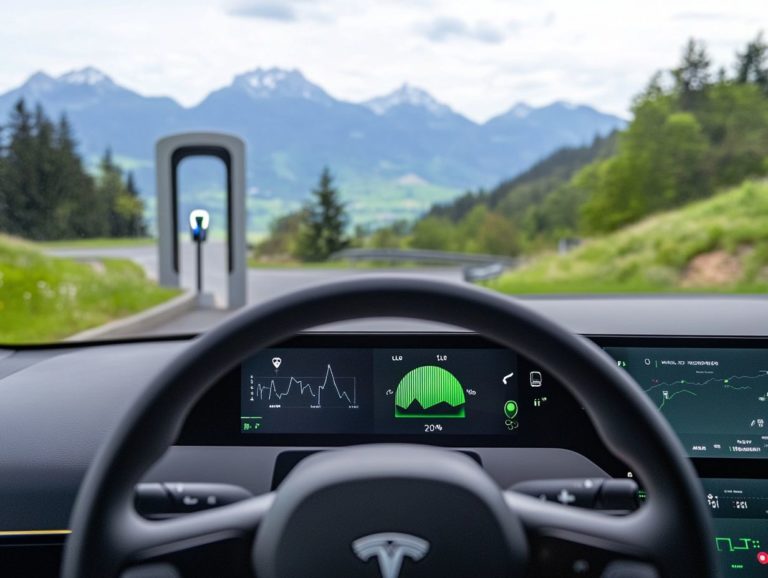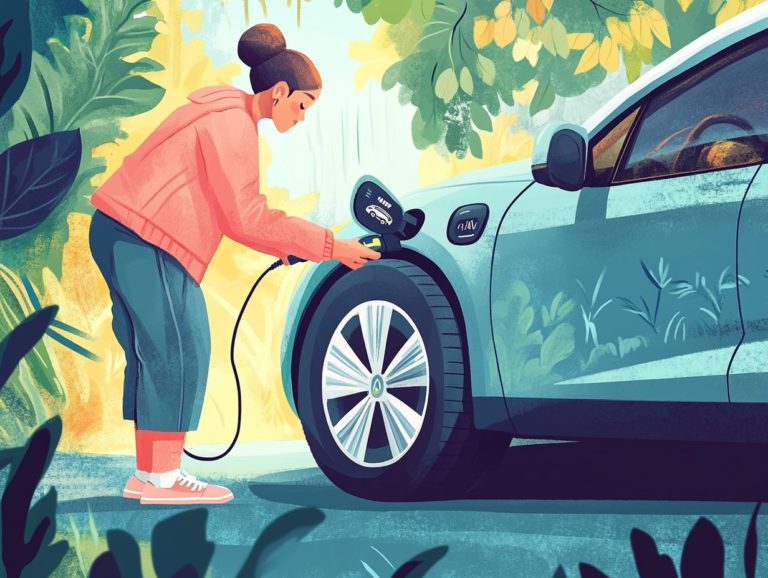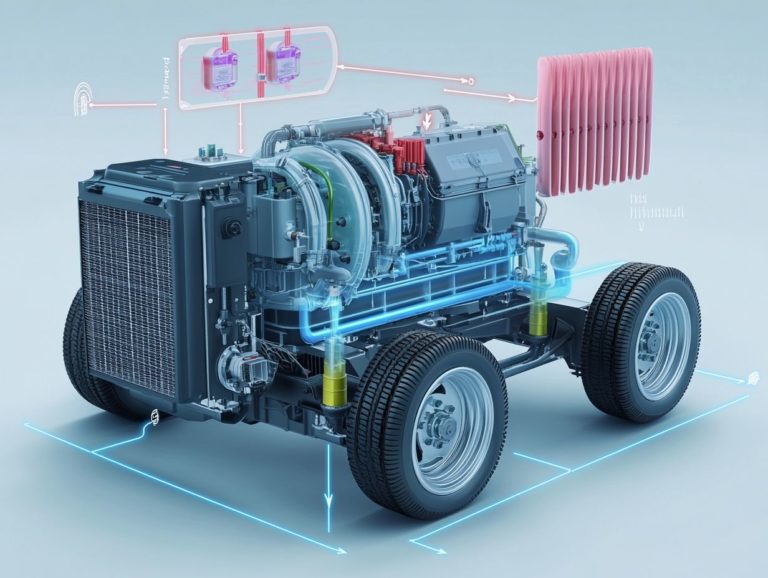common misconceptions about ev battery maintenance
As electric vehicles (EVs) surge in popularity, grasping their battery technology becomes crucial for both new and experienced drivers.
This article delves into the various types of EV batteries and their functioning, while debunking common myths that can create confusion around battery care.
You may have heard that batteries need to be fully drained before charging. Perhaps you’ve also been misled about the effects of temperature and maintenance this is where clarity is essential for every EV owner.
You will also find practical tips for extending battery life and monitoring its health, ensuring you maximize the potential of your electric vehicle.
Contents
- Key Takeaways:
- Understanding EV Batteries
- Common Misconceptions about EV Battery Maintenance
- Proper Maintenance of EV Batteries
- Frequently Asked Questions
- What are common misconceptions about EV battery maintenance?
- Do EV batteries require regular maintenance?
- Is it true that EV batteries are not safe and can catch fire?
- Do EV batteries lose their capacity over time?
- Do I need to completely drain my EV battery before charging it?
- Do I need to take special precautions when storing my EV for an extended period?
Key Takeaways:
Contrary to popular belief, EV batteries do not need to be fully discharged before charging. In fact, it is recommended to charge regularly to maintain battery health.
While extreme temperatures can affect battery performance, modern EV batteries are designed to withstand a wide range of temperatures and do not require special precautions.
EV batteries are built to last and do not need to be replaced frequently. With proper maintenance and care, an EV battery can last for many years.
Understanding EV Batteries
Grasping the intricacies of EV batteries is crucial for anyone contemplating a shift from gasoline cars to electric vehicles (EVs). These batteries are at the heart of electric cars, playing a vital role in their operation and greatly aiding in the reduction of greenhouse gas emissions.
The advancements in battery technology, especially with lithium batteries, not only extend electric range but also resonate with contemporary renewable energy goals, positioning them as a fundamental element in today’s automotive landscape.
Additionally, insights from organizations like the Department of Energy and Argonne National Laboratory provide valuable understanding of battery manufacturing processes and their implications for the power grid.
Types of EV Batteries
You ll find several types of EV batteries powering electric vehicles, with lithium-ion batteries leading the charge thanks to their impressive energy density and efficiency. The landscape is evolving, introducing alternatives like solid-state batteries, which hold the promise of enhanced safety and longer lifespans by swapping out liquid electrolytes for solid materials.
Each battery type brings its own set of advantages. For example, lithium-ion batteries shine when it comes to rapid charging and lightweight design, boosting vehicle performance and enabling quicker acceleration.
Meanwhile, solid-state batteries are creating quite a stir for their potential to lower the overall carbon footprint, utilizing more sustainable materials and minimizing the risk of overheating, a situation known as thermal runaway.
Innovations in sodium-ion and flow batteries are poised to further diversify the options available, contributing to environmentally friendly advancements in the EV sector.
How They Work
EV batteries function by storing electrical energy and transforming it into mechanical energy, which powers the electric motor to propel your vehicle.
This intricate process begins when you charge the battery, allowing electrical energy to flow into the cells. As electrons traverse the internal circuitry, they engage in a chemical reaction that converts this energy into a potential charge.
The efficiency of this transformation hinges on the type of charging station you choose. Fast chargers deliver a higher voltage, speeding up the process, while standard outlets provide a slower, more gradual charge.
Effectively managing charging cycles and maintaining the optimal battery temperature are essential. These factors can dramatically extend your battery s life and ensure that your vehicle performs consistently, driving home the importance of proper care.
Common Misconceptions about EV Battery Maintenance
Despite the rising allure of electric vehicles (EVs), you may encounter several widespread misconceptions about EV battery maintenance that could dissuade potential adopters and mislead current owners.
These misunderstandings can impact not only emissions reductions but also the overall adoption of EVs.
By grasping the truth behind these EV maintenance myths, you can make informed decisions about battery maintenance and replacements, thereby ensuring your vehicle operates at peak performance and enjoys a long, fruitful life.
Start applying these tips today to keep your battery healthy and your vehicle running smoothly!
Myth #1: EV Batteries Need to be Fully Discharged Before Charging
Many believe that EV batteries should be fully discharged before recharging. This myth can actually harm your battery’s health, so it’s important to learn how to maintain your EV battery at home.
Modern electric vehicles come equipped with smart battery systems that help manage charging and discharging. These systems allow for greater flexibility in how you charge.
Instead of waiting for your battery to deplete, consider frequent, partial charges. This approach helps maintain its capacity over time.
It s wise to adopt smart charging habits. Plug in when the battery reaches around 20%, and unplug before it hits 80% during regular use.
By embracing this knowledge, you ll be amazed at how much longer your battery lasts!
Myth #2: Extreme Temperatures Can Damage EV Batteries
Another common misconception is that extreme temperatures, whether scorching hot or biting cold, can cause irreversible damage to EV batteries, especially lithium ones. To learn more about proper care, check out this guide on how to avoid common EV maintenance mistakes.
While it s true that temperature extremes can affect performance and lifespan, advancements in battery management and cooling technologies help tackle these challenges.
These innovations keep your battery at optimal temperatures, ensuring that excessive heat during charging or frigid temperatures during use don t lead to significant degradation.
For example, cutting-edge thermal management systems help keep the battery at the right temperature for optimal performance.
This not only boosts immediate performance but also prolongs the overall lifespan of the battery. You can rest easy about temperature fluctuations!
Myth #3: EV Batteries Need to be Replaced Frequently
It’s a common misconception that EV batteries have a short lifespan and require frequent replacements, which raises concerns about long-term costs. Understanding the top 5 maintenance mistakes for EV owners can help alleviate these worries.
However, advancements in battery technology have enhanced both lifespan and reliability. Most modern electric vehicles come with batteries that can last anywhere from 8 to 15 years, depending on usage and environmental conditions.
Manufacturers provide warranties covering battery performance for up to 100,000 miles or eight years. This gives you peace of mind about your investment.
Today, the need for frequent battery replacements is outdated, especially with continuous innovations in battery chemistry and management systems.
Myth #4: Only the Dealership Can Service EV Batteries
Many potential EV owners think that only authorized dealerships can handle battery maintenance and repairs, limiting their options.
However, independent automotive repair shops often offer reliable and competitive services.
By understanding the nuances of battery technology, you can communicate your needs effectively, ensuring your EV s longevity.
These independent shops can provide cost-effective solutions, and their expertise often rivals that of larger dealerships.
By exploring various options, you can balance quality care and affordability. Your electric vehicle will operate at its best!
Proper Maintenance of EV Batteries
Maintaining your EV batteries is essential for optimal vehicle performance and extending their lifespan.
Prioritizing this care is a key responsibility for every electric vehicle owner.
Tips for Extending Battery Life
You have access to several effective strategies for extending the lifespan of your EV batteries.
By adopting simple practices, like charging your vehicle regularly instead of allowing the battery to deplete completely, you can significantly enhance battery health.
It s also prudent to keep your battery away from extreme temperatures; both excessive heat and severe cold can negatively impact performance.
Utilizing manufacturer-recommended charging stations provides the right charge, helping maintain battery integrity.
By consistently monitoring your charging habits and making small adjustments, you can achieve noticeable improvements in battery longevity over time.
Take control of your EV battery s health today!
How to Monitor Battery Health
Monitoring battery health is crucial for maintaining optimal performance and ensuring your electric vehicle operates efficiently over time. Various methods are available for tracking your vehicle’s battery condition.
One effective approach is to use specialized apps that provide real-time data on battery status and overall health metrics. These apps can also track charging cycles, which refers to the number of times a battery can be charged and discharged.
Vehicle diagnostics are significant as well. Many modern cars come equipped with onboard systems that automatically assess battery performance and relay that information to you.
Regular checks, such as visual inspections and testing for anomalies, can greatly enhance battery longevity. These practices help ensure your battery delivers reliable power for your daily journeys.
Frequently Asked Questions
-
What are common misconceptions about EV battery maintenance?
Many believe that EV batteries need frequent replacement. In reality, most EV batteries last 8-10 years, and proper maintenance can extend that lifespan.
-
Do EV batteries require regular maintenance?
Yes, while minimal compared to traditional gasoline-powered cars, regular maintenance involves monitoring the battery’s state of charge and avoiding extreme temperatures.
-
Is it true that EV batteries are not safe and can catch fire?
No, while rare incidents of EV battery fires have occurred, they are often due to external factors. EV batteries are designed with safety features to prevent such issues.
-
Do EV batteries lose their capacity over time?
Yes, like any battery, EV batteries will gradually lose capacity. However, proper maintenance and monitoring can minimize this loss.
-
Do I need to completely drain my EV battery before charging it?
No, it is a misconception. In fact, charging your EV battery frequently and not draining it completely is recommended, as it helps prolong its lifespan.
-
Do I need to take special precautions when storing my EV for an extended period?
Yes, proper storage is essential. Keep the battery charged to around 50%, store the vehicle in a cool and dry place, and check on the battery periodically.
Remember, actively monitoring your battery health can significantly enhance your EV’s performance and longevity. Start keeping track today!





